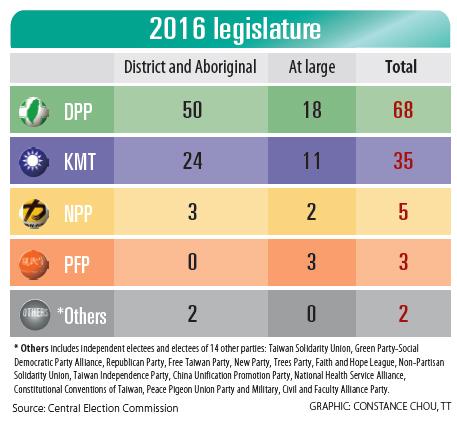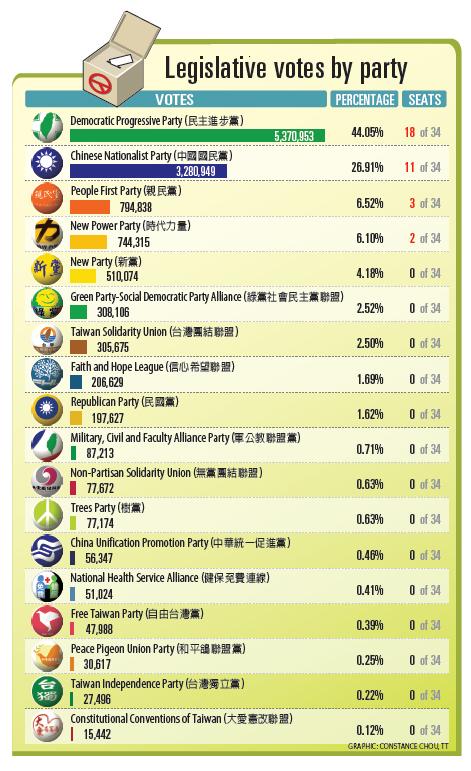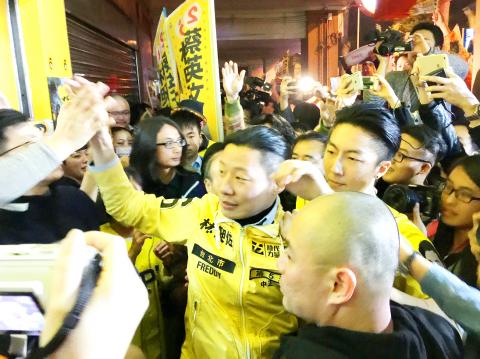The Democratic Progressive Party (DPP) yesterday won an absolute majority in the 113-seat legislature for the first time, with 60 percent of its regional legislative candidates winning in their respective electoral districts and securing more than 44 percent of the vote.
The Chinese Nationalist Party (KMT) has lost the 64-seat majority it won in 2012, retaining 35 seats in the legislature.
The newly formed New Power Party (NPP) had spectacular success, winning all three districts where it fielded regional legislative candidates and crossing the 5-percentage-point threshold to be awarded legislator-at-large seats.

Graphic: Constance Chou and June Hsu, Taipei Times
The most attention-grabbing legislators-elect are the NPP’s Huang Kuo-chang (黃國昌), Hung Tzu-yung (洪慈庸) and Freddy Lim (林昶佐), as well as the DPP’s Hsiao Bi-khim (蕭美琴) in Hualien County, who had all been predicted to have tough battles in traditional KMT strongholds.
The DPP achieved a home run in the cities and counties south of the Jhuoshuei River (濁水溪) — Yunlin and Chiayi counties, Tainan, Kaohsiung and Pingtung City — winning a total of 21 seats.
Former Taipei mayor Hau Lung-bin (郝龍斌) was defeated in Keelung by the DPP’s Tsai Shih-ying (蔡適應).

Graphic: Constance Chou, Taipei Times
In New Taipei City, which has 12 electoral districts and where KMT presidential candidate Eric Chu (朱立倫) serves as mayor, the KMT lost eight seats that it formerly held, with only two lawmakers — Luo Ming-tsai (羅明才) and Lin Te-fu (林德福) — retaining their seats.
The DPP won seven more seats than it had four years ago, securing nine seats, while the NPP secured one.
Huang, one of the leading Sunflower movement activists, defeated incumbent KMT Legislator Lee Ching-hua (李慶華), who had been elected seven times in a row, in New Taipei City’s Sijhih District (汐止).

Photo: CNA
KMT Legislator Chang Ching-chung (張慶忠), whose “30-second ramming through” of the cross-strait service trade agreement in 2014 helped spark the Sunflower movement and who was seeking his fourth term, lost his seat to the DPP’s Chiang Yung-chang (江永昌).
In Taoyuan, where the KMT had won all six electoral districts in 2012, the DPP gained three seats, while the KMT retained two and an independent won one.
DPP caucus whip Ker Chien-ming (柯建銘) snatched a seat in Hsinchu City, which had belonged to the KMT.
In Hsinchu County, former commissioner Cheng Yung-chin (鄭永金), a non-affiliated candidate supported by the DPP, was defeated by KMT legislative candidate Lin Wei-chou (林為洲).
The KMT managed to retain two seats each in Miaoli and Nantou counties.
In Taichung, the KMT won three out of eight districts — dropping from five in 2012 — while the DPP won four, with Hung winning the final seat.
In Changhua County’s four electoral districts, the DPP gained three seats, while the KMT won one, a reversal of what the two parties won in the county four years ago.
In eastern Taiwan, both electoral districts in Hualien and Taitung counties saw their respective DPP candidates elected.
The outlying islands — Penghu, Kinmen and Matsu — elected DPP, KMT and KMT lawmakers respectively.
The DPP, KMT, People First Party (PFP) and NPP were the only four parties to cross the 5-percentage-point threshold for legislator-at-large seats.
A total of 18 candidates on the DPP’s legislator-at-large candidate list secured seats with the party’s 44 percent of party representation vote.
The KMT received 11 seats through 26.9 percent of party votes.
The PFP, with 6.5 percent of party votes, won 3 seats, while the NPP garnered 6.1 percent for 2 seats.

CHAOS: Iranians took to the streets playing celebratory music after reports of Khamenei’s death on Saturday, while mourners also gathered in Tehran yesterday Iranian Supreme Leader Ayatollah Ali Khamenei was killed in a major attack on Iran launched by Israel and the US, throwing the future of the Islamic republic into doubt and raising the risk of regional instability. Iranian state television and the state-run IRNA news agency announced the 86-year-old’s death early yesterday. US President Donald Trump said it gave Iranians their “greatest chance” to “take back” their country. The announcements came after a joint US and Israeli aerial bombardment that targeted Iranian military and governmental sites. Trump said the “heavy and pinpoint bombing” would continue through the week or as long

TRUST: The KMT said it respected the US’ timing and considerations, and hoped it would continue to honor its commitments to helping Taiwan bolster its defenses and deterrence US President Donald Trump is delaying a multibillion-dollar arms sale to Taiwan to ensure his visit to Beijing is successful, a New York Times report said. The weapons sales package has stalled in the US Department of State, the report said, citing US officials it did not identify. The White House has told agencies not to push forward ahead of Trump’s meeting with Chinese President Xi Jinping (習近平), it said. The two last month held a phone call to discuss trade and geopolitical flashpoints ahead of the summit. Xi raised the Taiwan issue and urged the US to handle arms sales to

State-run CPC Corp, Taiwan (CPC, 台灣中油) yesterday said that it had confirmed on Saturday night with its liquefied natural gas (LNG) and crude oil suppliers that shipments are proceeding as scheduled and that domestic supplies remain unaffected. The CPC yesterday announced the gasoline and diesel prices will rise by NT$0.2 and NT$0.4 per liter, respectively, starting Monday, citing Middle East tensions and blizzards in the eastern United States. CPC also iterated it has been reducing the proportion of crude oil imports from the Middle East and diversifying its supply sources in the past few years in response to geopolitical risks, expanding

Pro-democracy media tycoon Jimmy Lai’s (黎智英) fraud conviction and prison sentence were yesterday overturned by a Hong Kong court, in a surprise legal decision that comes soon after Lai was jailed for 20 years on a separate national security charge. Judges Jeremy Poon (潘兆初), Anthea Pang (彭寶琴) and Derek Pang (彭偉昌) said in the judgement that they allowed the appeal from Lai, and another defendant in the case, to proceed, as a lower court judge had “erred.” “The Court of Appeal gave them leave to appeal against their conviction, allowed their appeals, quashed the convictions and set aside the sentences,” the judges